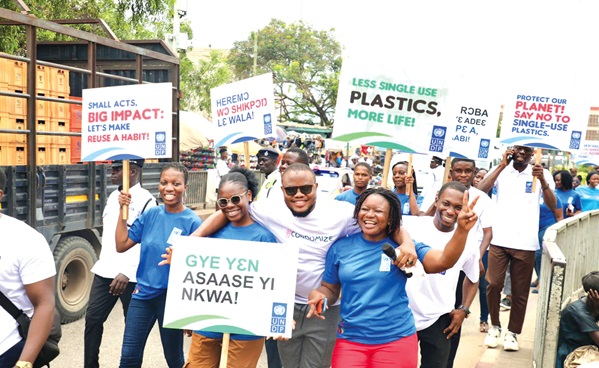
UNDP service personnel sensitise traders to single-use plastic effects
Service personnel of the United Nations Development Programme (UNDP) and the UN Volunteers last Thursday embarked on a public sensitisation campaign at the Makola Market in Accra to raise awareness about the adverse impact of single-use plastics on the environment.
The exercise saw personnel of the two bodies putting themselves into six groups and walking from the premises of the Accra Metropolitan Assembly through the Ghana School of Law and Kimbu to educate the public.
They schooled traders, hawkers, customers and the general public on the importance of using recycled materials and reducing single-use plastics.
The initiative, which was held under the theme: “Driving Change: Influencing behavioural change in addressing plastic waste menace in Makola Market”, was also used to distribute reusable tote bags to traders to encourage the use of sustainable materials.
They carried placards some of which read “Small acts, big impacts.
Let’s make reuse a habit”, “Less single-use plastics, more life”, “Protect our planet!
Say no to single-use plastics” and “Youth, unity, sustainability: Volunteer for nature”.
Briefing the Daily Graphic on the exercise, the UNDP Head of Environment and Climate Cluster, Dr Stephen Kansuk, said the campaign was aimed at fostering positive behavioural changes to reduce the consumption and disposal of single-use plastics within the Makola Market.
He said initiative was targeted at increasing awareness about the environmental consequences of single-use plastic waste and the benefits of using recyclable materials among approximately 5,000 people.
“We hope to encourage greater adoption of reusable bags among traders and customers as alternatives to single-use plastics and reduce plastic waste pollution at Makola Market,” he said.
Threat to ecosystem
Dr Kansuk said plastic waste was a major environmental challenge that posed serious threats to ecosystems, human health, and the overall well-being of the planet.
Single-use plastics, in particular, played a significant role in exacerbating such challenge, he said.
In his view, annually Ghana generated over 1.7 million tonns of plastic waste, with the majority being single-use plastics.
“However, about 86 percent of Ghana's plastic waste was disposed of improperly, leading to the accumulation of plastics in storm water drains, rivers and streams, ultimately finding their way into the oceans,” he said.
Dr Kansuk quoted a World Bank 2020 report that showed that an estimated 250,000 metric tonns of plastic waste from Ghana ended up in the Atlantic Ocean.
Protecting environment
On why the exercise was targeted at the Makola Market, Dr Kansuk said the market, located in the heart of the national capital, was one of the largest and busiest markets in the region but also a crucial economic and cultural hub.
It served as a primary source of livelihood for many traders, vendors, and entrepreneurs.
“Like many urban markets, Makola Market witnesses significant consumption of single-use plastics, primarily used for packaging food items, beverages and various other products.
“The prevalence of single-use plastics in the market reflects consumer habits and the convenience factor,” Dr Kansuk explained.
He, therefore, stressed the urgent need to raise awareness regarding the environmental impact of single-use plastics to promote the use of recyclable materials or plastics.
“This effort aims to protect our environment by encouraging market-goers to opt for reusable bags when shopping and inspiring traders to encourage their customers to make more environmentally conscious choices,” Dr Kansuk added.
